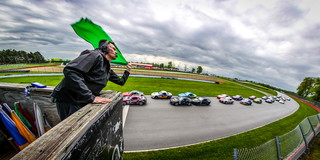
While we often think of the cars, workers are the true lifeblood of the Sports Car Club of America®. Since the Club’s entry into motorsports in the mid- to late-1940s, the need for volunteer workers has been a prime topic of discussion. Throughout its nearly 80 years of existence, SCCA has consistently campaigned to attract a dedicated worker force, with that most recently taking the form of a strategic partnership with IMSA in 2020. While the goal of that partnership is multifold, a primary purpose is to emphasize a path SCCA volunteers can take, beginning at a local SCCA Road Racing weekend and culminating with a vital trackside role at an IMSA professional racing weekend. In fact, it was this exact topic that made RACER’s YouTube channel, with RACER’s Marshall Pruett chatting trackside with IMSA President John Doonan during the 2023 Mobil 1 Twelve Hours of Sebring.
“From the time you and I were going to the racetrack as little boys, we know that the event could not happen without our corner marshals, our race officials,” Doonan said to Pruett while standing at Sebring’s Turn 17 corner station. “No doubt, the race teams and the drivers, they put on the show, but the real unsung heroes, the folks that actually allow us to operate these events, are certainly the ones behind us and all over the track here this weekend to execute the Twelve Hours of Sebring.”
Doonan’s history with the SCCA involves not only racing, but also flagging, with Doonan currently holding a Regional Flagging and Communications license. Prior to his role at IMSA, he headed Mazda Motorsports, ensuring Mazda’s connection with the SCCA stayed strong.
“When I first got to IMSA, I had a discussion with [NASCAR Vice Chairman and Executive Vice President] Jim France and Ed Bennett about how we fill that pipeline going forward, and my first comment was to get a partnership with SCCA,” Doonan explained. “[SCCA President and CEO] Michael Cobb and [SCCA Vice President, Road Racing] Eric Prill and I sat down at the Rolex 24 right away and said, what can we do together? … Eric, [SCCA Director, Road Racing] Deanna Flanagan, Mike Cobb, their whole team in Topeka, got together and built out some training modules.”
The online training program being developed by SCCA is a multi-tiered initiative spanning a variety of programs from RoadRally to Solo, Road Racing, and beyond, with the initial phase entering beta testing in April.
SCCA Academy’s Flagging and Communications courses referenced in this video include modules covering an overview of the specialty, event resources and licensing, corner station operations, flags and flagging, communications, and emergency medical. All content will be delivered through the SCCA Academy Learning Management System (LMS).
This education offers SCCA members a solid foundation on which to build on with real-world experience at local SCCA races. From there, SCCA members can apply to work at professional races, like those IMSA hosts, with professional sanctioning bodies leaning heavily on SCCA’s trained and experienced worker force.
“You can’t buy these tickets – and we’re not kidding when we say this is the best ticket in the house. Look at this,” Pruett said in the video, motioning to the corner marshals working behind them. “You get no closer. Now granted, you are working, whether it’s fire specialists, whether it’s our flaggers, you name it – but if you want to be as close to the cars as you can possibly get, you’re a volunteer worker.”
“There are Regions of the SCCA all over North America, and we’re super excited to allow SCCA to execute the training modules from learning how to be a corner marshal to working in Timing and Scoring to working in tech to working grid…working pit lane,” Doonan continued. “And they’re going to need experience – no doubt, you can’t just roll into the track and become a corner worker, but there’s a proper set of training to get you to that point. And then long and beyond, we can attract the next generation of worker, the folks that want to be a part of this sport that I’m so grateful [for] over the years. I had the chance to [come to races] when I was little, and growing up I could finally work a corner, and there’s no better seat in all of motorsports than at the apex of some of the [best] corners in all of racing.”
View the complete five-minute interview below, or on RACER’s YouTube channel.










